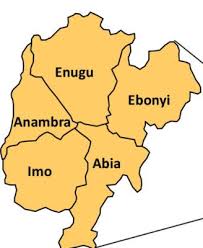… Transporters Lose N13 Billion Weekly
… SMEs Lose N4.6 Trillion
The persistent enforcement of weekly sit-at-home orders in South-east Nigeria by the Indigenous People of Biafra (IPOB) has resulted in a staggering economic loss of about N7.6 trillion over the last four years, a new report by SBM Intelligence reveals.
Titled “Four Years of Disruption,” the report chronicles how what began as a symbolic protest demanding the release of IPOB leader Nnamdi Kanu has metamorphosed into a severe economic and humanitarian crisis that has crippled livelihoods, education, and governance across Abia, Anambra, Ebonyi, Enugu, and Imo states.
Since 2021, Mondays have become days of economic paralysis in the South-east, with major commercial hubs, including Onitsha Main Market—Africa’s largest wholesale market—witnessing near-total shutdowns.
Streets remain deserted, businesses close shop, and transport operators are forced off the roads, leading to profound disruptions in trade and commerce.
SBM Intelligence estimates that micro, small, and medium enterprises (MSMEs) in the region lose about N4.6 trillion annually due to repeated closures, while transporters forfeit between N10 billion and N13 billion every Monday.
These losses stem from interrupted supply chains and halted commercial activities.
The report further highlights the violent methods employed by IPOB’s armed wing, the Eastern Security Network (ESN), alongside other criminal gangs, to enforce the sit-at-home directive. Incidents of arson, kidnappings, targeted killings, and intimidation have been widely reported.
Between 2021 and 2025, SBM Intelligence recorded 332 violent incidents linked to the sit-at-home protests, resulting in 776 fatalities. Imo and Anambra states bear the brunt, accounting for more than half of the deaths, according to the report.
What began as a movement rooted in genuine grievances over marginalization and the detention of Nnamdi Kanu has, according to SBM, been hijacked by violence, criminality, and internal divisions within IPOB.
This evolution has eroded public sympathy and deepened insecurity in the region.
The report stresses that the prolonged disruption has crippled educational activities, weakened governance structures, and devastated household incomes, pushing many families into poverty.
Efforts by state governments to restore normalcy have yielded mixed results.
Enugu State Governor, Peter Mbah, introduced penalties for compliance with sit-at-home orders, a move that appears to have encouraged a tentative return to routine activities in the state.
Similarly, security crackdowns in Ebonyi and other states have aimed at curbing the violence and reviving economic activities, but the deep-rooted nature of the crisis continues to pose formidable challenges.
The SBM Intelligence report underscores the urgent need for inclusive dialogue involving all stakeholders to address the underlying issues fueling the unrest.
Without a concerted effort to reconcile and reintegrate the aggrieved groups, the South-east’s economic and social prospects remain bleak.
Do you want to share a story with us? Do you want to advertise with us? Do you need publicity for a product, service, or event? Contact us on WhatsApp +2348183319097 Email: platformtimes@gmail.com
We are committed to impactful investigative journalism for human interest and social justice. Your donation will help us tell more stories. Kindly donate any amount HERE




